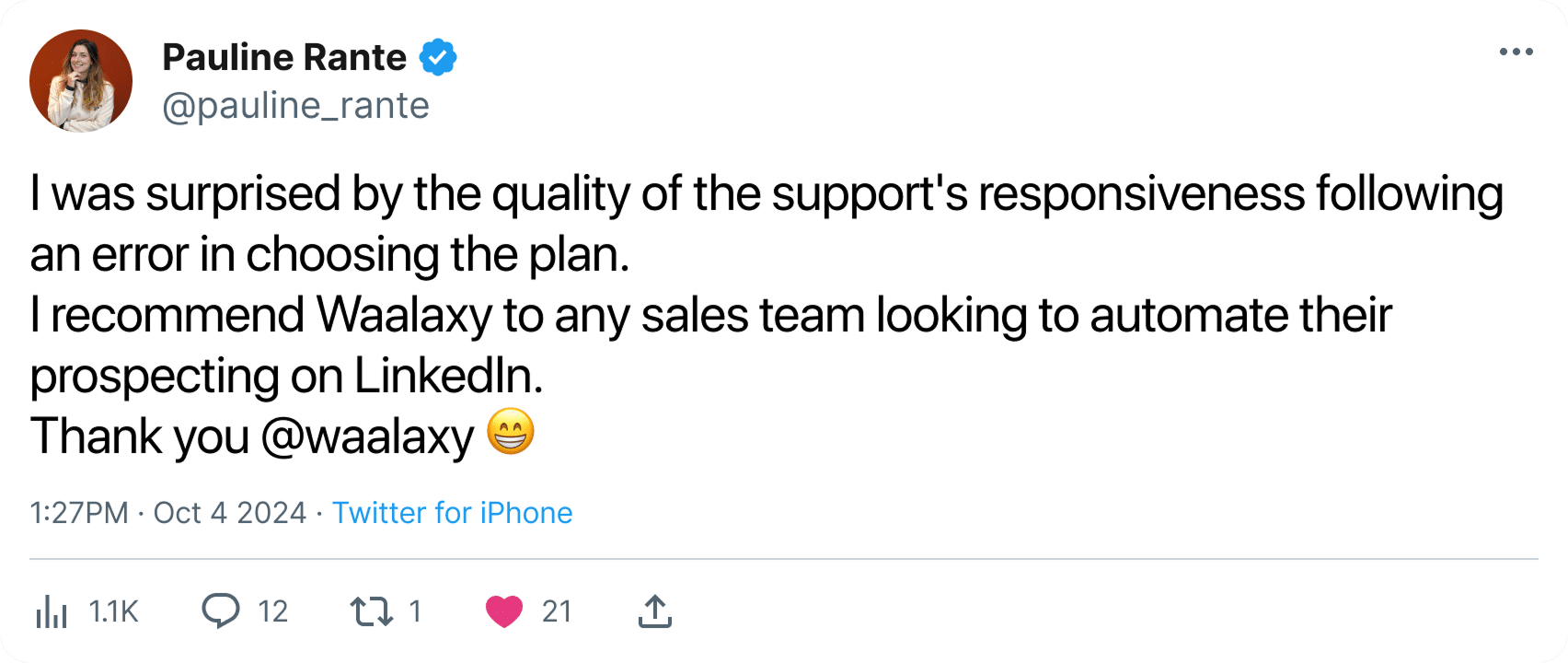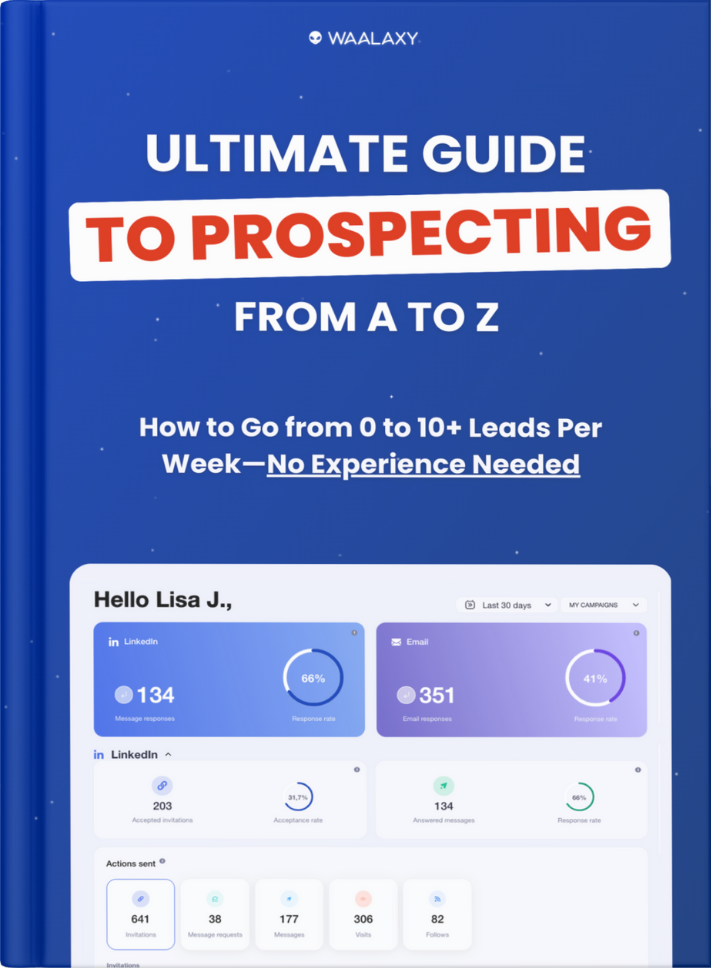Did you know what is CSAT? This is a key indicator for companies who want to know more about their performance.
Whether you’re an innovative startup or a well-established company, understanding and optimizing your CSAT is essential to guaranteeing an exceptional customer experience.
As you’ll have gathered, in this article we’ll be delving into the heart 🫀 of the satisfaction rate, but not only: 👇🏼
- Advantages and limitations.
- The calculation formula.
- How to analyze results.
- Tips for increasing your CSAT.
- The difference between CSAT, NPS and CES.
Do you have a notebook? Great, let’s get started! 😇
What is CSAT Score?
The satisfaction rate (or Customer Satisfaction Score) is a metric that evaluates the level 📊 of customer satisfaction in relation to a product, service or other specific experience offered by a company.
Generally, to measure this, customers are asked to express their satisfaction on a scale, often from 1 to 5 where :
- 🔴 1 indicates complete dissatisfaction.
- 🟢 5 indicates total satisfaction.
If you would like a more complete picture of satisfaction and the customer experience, it is often combined with other metrics, such as the Net Promoter Score (NPS) or Customer Effort Score (CES).
What is a good scat score?
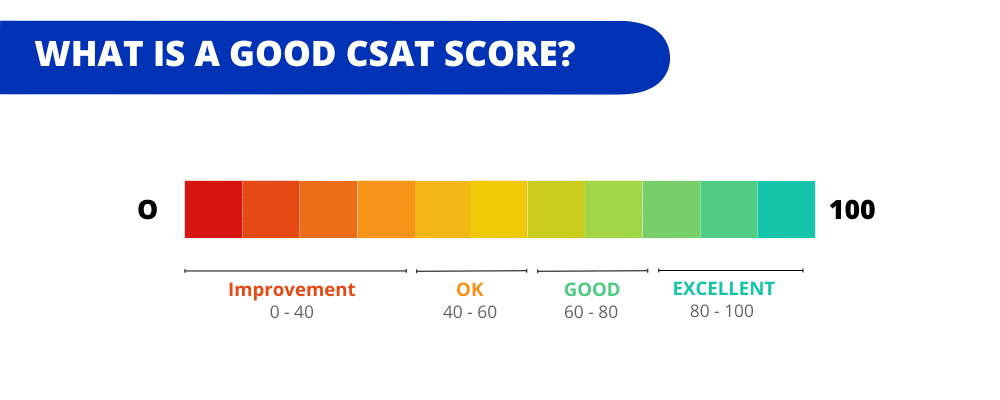
Generally speaking, a CSAT of 65% or more is considered good, indicating that the majority of customers are satisfied in their experience. 👀
However, in some highly competitive sectors, a small gap can make all the difference. In such cases, a higher score is required to stand out from the crowd, to build customer loyalty.
Finally, be careful with high scores, such as 90%, as they may be difficult to maintain as the customers increase. 📊
We talk about all this further down in the article. 😇
The benefits of the customer satisfaction score
Now that you know what it is, we can move on to the benefits! ⬇️
- Simplicity and clarity: easy to understand and implement.
- Direct feedback: provides immediate feedback on specific experiences, helping to identify problems or strengths quickly.
- Specific measurement: provides precise information on specific points of the service or product.
- Easy monitoring: track changes and the customer journey over time.
- Adaptability: adaptable to different points of contact or experience.
What are its limits?
Of course, nobody’s perfect, and we’ve analyzed CSAT’s limitations. Let’s find out together.
- Lack of context: without additional questions, CSAT provides no context for the reasons for satisfaction or dissatisfaction.
- Influence of expectations: scores can be influenced by customers’ prior expectations, which are not always linked to product or service quality.
- Extreme results: the customers most likely to respond are often those with very positive or very negative experiences, which can bias the results.
- Not an indicator of loyalty: a high score does not necessarily mean that customers are loyal, or that they will advertise positively for the brand.
What’s more, there is sometimes much dissatisfaction, but we don’t know why; there are only bad grades, but no explanations.
How do you calculate customer satisfaction?
Visit score is presented as a percentage. The higher the percentage, the higher the level of customer satisfaction high. 📈
Okay, let’s take an example, I know you like it. 👇🏼
You have received the following scores from 5 customers: 4, 5, 3, 4 and 5. Your calculation would be :
(4+5+3+4+5 / 5) x 100 = 84.
On average, 84% of customers are satisfied with the experience or service.
How do you measure the CSAT customer satisfaction score?
Now that you know the formula, it’s important to know what to use to measure it. We’ll explain it all to you! ⬇️
#1. Define the different distribution media
The choice and diversity of the channels you use can influence the range 🎯 and the accuracy of the results obtained.
That’s why you can start by targeting the platforms where your customers are most active, such that:
- Integrated survey on your website.
- Satisfaction questionnaire.
- Google My Business.
- E-mail survey after purchase or service.
- Notification platform:
- Trustpilot ➡️ online shopping and establishments.
- Tripadvisor ➡️ restaurant, hotel, business.
- Capterra ➡️ B2B software and applications.

In addition, don’t hesitate to use point-of-sale feedback systems for physical customers.
Why is this? Well, the aim is to make it as easy as possible for customers to get involved, by offering them varied and accessible options.
For this, a little advice, make sure that these supports are optimized for different devices, such as phones, computers, and even tablets because, a large part of online interactions are done via mobile! 📱
As you can see, by diversifying your distribution channels, you’ll increase your sales quality of your answers, this enables more accurate analysis of customer satisfaction. 👀
#2. Formulating questions
Your question should be clear, concise and directly related to the customer’s experience with your product or service.
For example, you can say: 👇🏼
On a scale of 1 to 5, how satisfied were you with your last experience with our product?
This is an example, but make sure the question is specific enough to get relevant answers.
And don’t hesitate to adapt the language and tone of the question to suit your audience channel marketing and target audience.
Okay, let’s pop 10 sample questions! 🧨
⭐️ Overall product or service experience :
- On a scale of 1 to 5, how would you rate your overall satisfaction with our product/service?
- To what extent has our product/service met your expectations?
🎧 Customer service :
- How would you rate the quality of support you received from our customer services team?
- Are you satisfied with our customer service response time?
💸 Buying experience :
- How would you rate the ease of ordering on our site?
- Rate your satisfaction with the payment process and transaction security.
🫱🏽🫲🏼 Use of the Product/Service :
- Do you find our product/service easy to use?
- Does the product/service meet your expectations in terms of performance and reliability?
👀 Global Value :
- Do you think our product/service offers good value for money?
- How likely would you be to recommend our product/service to a friend or colleague?
These questions will help you improve your customer retention! 😇
#3. Suggest different answers
Typically, the satisfaction rate uses a scale of rating often from 1 to 5, where 1 could represent “Very dissatisfied” and 5 “Very satisfied”.
To do this, make sure the scale is intuitive and easy for customers to understand.
But that’s not all! Don’t hesitate to include additional options, such as comments, to allow customers to express themselves more fully about their level of satisfaction.
In some cases, you can add a “neutral” or “no opinion” option for customers who may not have a strong opinion.
Okay, here are some sample answers. ⬇️
🪜 Digital scale :
- Answers from 1 to 5, where 1 = Very dissatisfied, 5 = Very satisfied.
- Answers from 1 to 5, where 1 = strongly disagree, 5 = strongly agree.
💬 Direct answers :
- Simple answers like “Yes” or “No”.
- “Yes”, “No”, “Sometimes” or “Not applicable”.
❓ Open questions:
- An open field for detailed comments.
- Several predefined options for customers to choose from.
📊 Frequency response :
- “Every day”, “Several times a week”, “Once a week”, “Rarely”, “Never”.
- “Very often”, “Often”, “From time to time”, “Rarely”, “Never”.
🩵 Emotional responses:
- 😡😐😃 Use emoticons or images to represent different levels of satisfaction or mood.
- 🔴🟠🟢 Use of colors (such as red for dissatisfied, green for satisfied) to indicate level of satisfaction.
- ⭐️ Use stars (1 star = very dissatisfied, 5 stars = very satisfied).
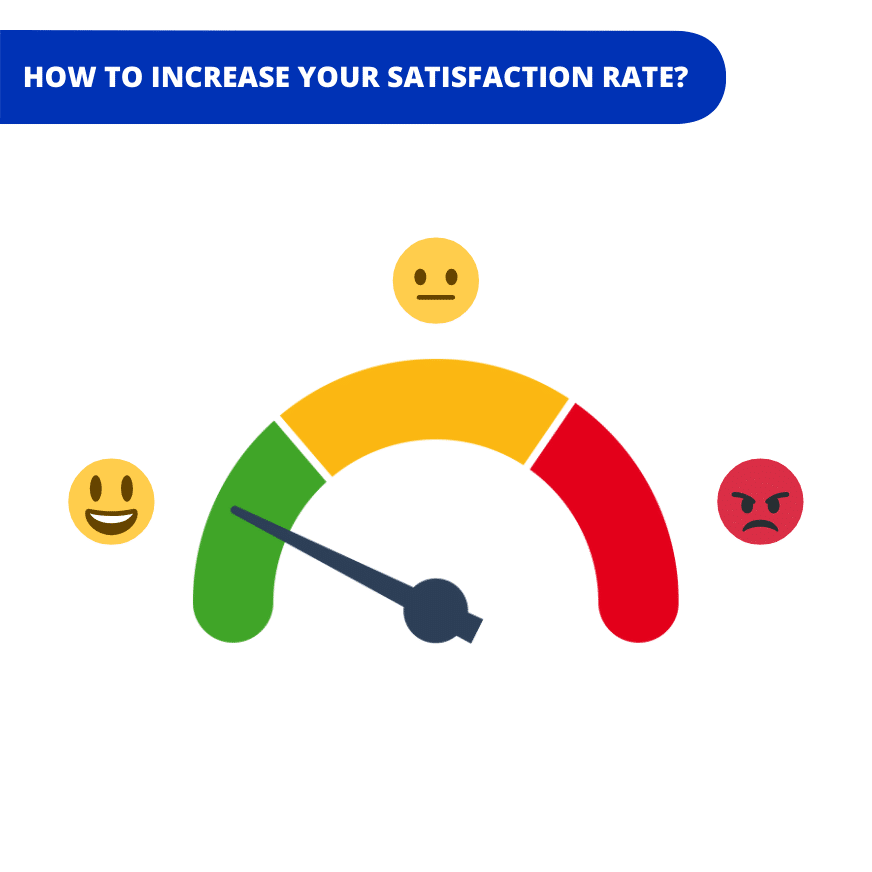
How do you analyze CSAT score results?
Now that you’ve collected a good number of results, it’s time to analyze them. And that’s what we’re going to do with the 🌾 field!
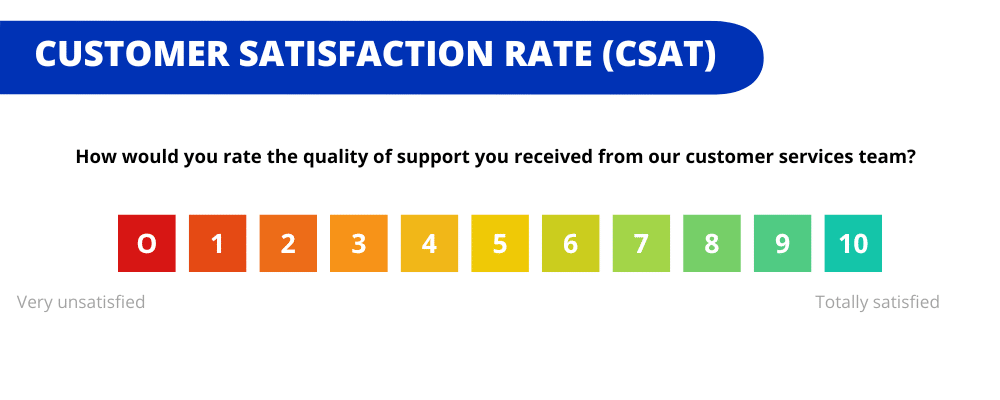
1) Number of responses
Large number of responses increases the reliability of your data, we already know that. Conversely, a low response rate may indicate problems in the way the survey is carried out.
![]()
A high volume of responses both indicates active participation for your customers, and reinforces the reliability of the data collected. In fact, the greater the number of participants, the more representative the results are of your customer base as a whole.
That’s why it’s essential to encourage your visitors to answer. ⭐️
To achieve this, think about engagement strategies (on Facebook for example), such as reminders, incentives. We can also offer you coupons 💸, or promotional codes to increase the number of responses.
2) Grading
As said before, looking at the distribution of scores in your results offers an overview of customer satisfaction. 😎
For example, a tendency towards high scores indicates an overall satisfaction a small concentration of low scores can highlight certain issues.

That’s why we advise you to look beyond the averages and examine the scores to understand the various problems your customer may be experiencing, and thus avoid the unhappy customer.
3) Analyze customer feedback
As you’d expect, customer reviews are a treasure trove 💛 of valuable information. Beyond the notes, they provide context and details about customer experiences.
That’s why you need to analyze these comments to understand the issues and possible improvements. And for that, our little secret recipe is to use text analysis techniques to sort and categorize comments. 👀
Here are our top 3 techniques:
- ☁️ Word cloud: this is a visual tool that highlights the words most frequently used in comments, providing a quick overview of the most important topics.
- 👁️ Thematic analysis: group comments into themes or categories based on their content, such as “customer service”, “product quality” or “price”.
- 🤖 Text classification: use AI to automatically classify comments into predefined categories.
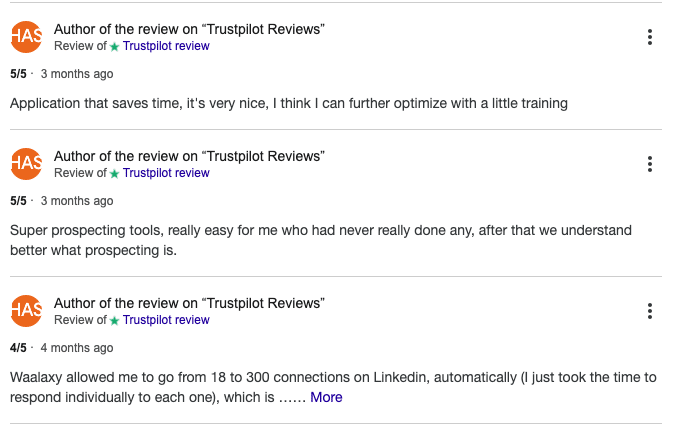
4) Good grades trap
A restaurant with 5 stars out of 2,000 reviews? 🤔 Some CSAT scores can be misleading.
Visit scores the high level of customer satisfaction can sometimes mask specific problems encountered by less satisfied customers. That’s why we advise you to thoroughly analyze and pay attention to all customer feedback! ✨
What’s more, as you may (or may not) know, it’s possible to buy likes, followers on LinkedIn and even Google reviews, so pay close attention to the quality of your reviews.
Don’t hesitate to calculate the satisfaction rate regularly to monitor any changes in your customers’ expectations. 😇
4 tips to increase your CSAT
It’s important to avoid making certain mistakes that could lead to lower your average quickly… That’s why we’re giving you 4 tips to follow if you want to increase your customer satisfaction! ⬇️
1) Deliver quality customer service
When we are customers, we expect a company to deliver impeccable customer service that’s fast, clear and meets our expectations. Well, if you’re a company, you have to respect that!
Here are some strategies you can implement within your company to achieve this: 👇🏼
- 🎓 Employee training:
- Invest in training for your customer service teams. Well-trained and informed employees are better equipped to respond effectively and empathetically to customer needs. Finally, encourage your employees to be self-reliant in solving problems quickly.
- ⚡️ Fast and efficient response:
- Put systems in place to ensure a rapid response to customer queries, whether by e-mail, live chat, social networks or even telephone. A fast response time can mean the difference between a satisfied customer and a frustrated one.
- 💟 Personalized service: treat every customer as a unique individual. A personalized approach shows that you value and understand your customers.
- ➡️ Post-service follow-up: a simple e-mail or call to ensure that the customer’s problem has been solved reinforces the feeling that your company really cares about customers.
- 🖥️ Adapted technology: tools such as chatbots, CRM (Customer Relationship Management) or AI assistance systems can improve your efficiency while personalizing the customer experience, perfect no?
2) Personalize the customer experience
First, it’s important to know your customers. To achieve this, you can use the data collected (purchasing preferences, history, feedback) to better understand their needs and their behavior.
Then you can: 👇🏼
- 1️⃣ Segment your customer base according to age, location, or purchasing behavior. This enables you to create more relevant marketing messages and targeted offers for each group.
- 2️⃣ Personalize your offers and recommendations according to each customer’s interests and preferences. For example, if a customer regularly buys a certain type of product, offer them complementary products, or even promotions related to it. 👀
- 3️⃣ Personalize the interaction with your customer by using their name or references to previous interactions.
- 4️⃣ Gather regular feedback to improve your approach through surveys, social network comments and behavioral analysis.
3) Be transparent
The penultimate tip is to be transparent. Whether in everyday life or in the workplace, transparency is important to building confidence customers. 🫱🏽🫲🏼
Today’s customers are increasingly well-informed and demanding, so this can be a significant competitive advantage!
This manifests itself in open and honest communication about products and services, like: ⬇️
- Features.
- Pricing.
- The politics of return.
- Warranties.
- Delivery delays.
- After-sales service.
In addition, the entire RPD data collection and use must be transparent. Indeed, consumers need to know how their data is collected, used and protected. 🔒
4) Encourage feedback
Last but not least… 🥁 feedbacks.
Customer feedback helps us to understand the needs, expectations, and needs of our customers in improvement areas.
But, how do you encourage feedback? 🤔
Firstly, it’s important to make the return process simple and accessible, in various ways, such as:
- Online surveys.
- Customer satisfaction surveys.
- Forms on your website.
- Social network comments.
- Human exchanges.
Don’t forget to make clear, direct questions! 💟
CSAT vs. NPS vs. CES?
All three are key indicators used to measure different aspects of the customer experience. However, each has its own small difference.
What could be better than a little chart to explain? 🤩
| Indicator | Focus | Question Type | Use |
|---|---|---|---|
| CSAT | Immediate satisfaction | “How satisfied are you with [product/service]?” on a scale of 1 to 5. | Ideal for specific feedback on particular transactions or interactions. |
| NPS | Customer loyalty | “On a scale of 0 to 10, how likely is it that you would recommend our company/product/service to a friend or colleague?” | Measures overall satisfaction and long-term customer loyalty, identifies promoters and detractors. |
| CES | Customer effort | “How easy did you find it to get a solution to your problem?” with a scale from “Effortless” to “Very difficult”. | Evaluates customer service efficiency and user experience, aims to reduce friction. |
How about a recap?
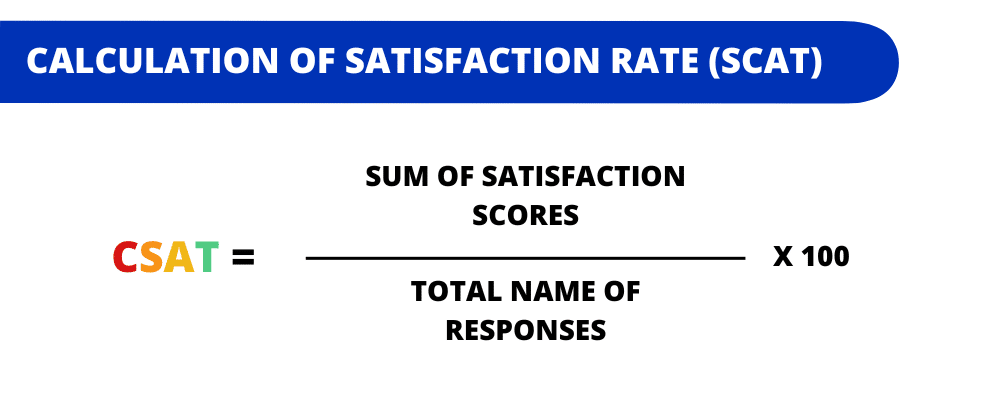
In case you’ve forgotten, here’s the formula! ⬆️
By integrating CSAT in the form of questionnaire comments on social networks in your performance measurement strategy. customer satisfaction, but also to strengthen their loyalty and commitment to your brand.
If you follow our advice, you’ll be able to lay the foundations for continuous improvement of the customer experience! 💟
Frequently asked questions
Hop hop hop, don’t go away so quickly, we still have a few resources to share with you! 👇🏼
What are the 3 indicators for measuring customer satisfaction?
The three main indicators from satisfaction measurement customers are:
- CSAT (Customer Satisfaction Score) ➡️ measures immediate customer satisfaction with a specific product, service or experience.
- NPS (Net Promoter Score) ➡️ evaluates customer loyalty and their ability to recommend the company.
- CES (Customer Effort Score) ➡️ measures the effort required by a customer to obtain a solution to their problem.
What is a good satisfaction rate?
Generally speaking, a CSAT of 65% or more is considered good, indicating that the majority of customers are satisfied with their experience. 👀
However, in some highly competitive sectors, a small gap can make all the difference. In such cases, a higher score is required to stand out from the crowd, to build customer loyalty.
Finally, be careful with high scores, such as 90%, as they may be difficult to maintain as the customers increase. 📊
What are the 4 expectations of customer satisfaction?
Here are the 4 main expectations of a customer:
- 1️⃣ Product or service quality.
- 2️⃣ Excellent customer service.
- 3️⃣ Easy, pleasant shopping experience.
- 4️⃣ Transparency and honesty.
That’s the end of this article, you know all about what is CSAT! 🐉


